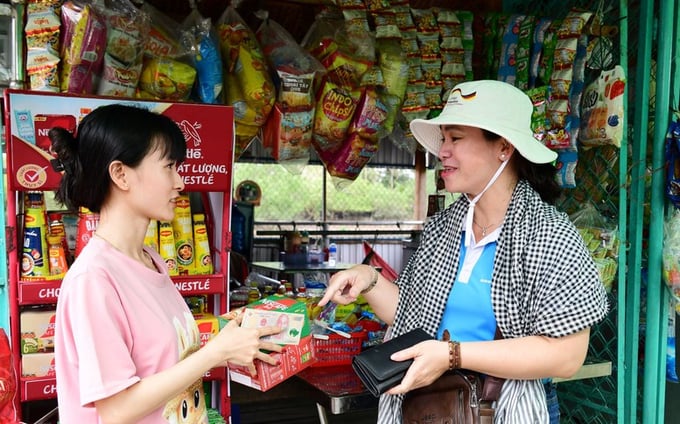November 27, 2025 | 20:50 GMT +7
November 27, 2025 | 20:50 GMT +7
Hotline: 0913.378.918
November 27, 2025 | 20:50 GMT +7
Hotline: 0913.378.918

The program "Nestlé accompanies women" helps women in Soc Trang have the opportunity to improve their knowledge and skills as well as create sustainable livelihoods. Photo: MT.
In the context of ESG (Environment, Society, Governance) becoming a key factor in achieving sustainable development goals, businesses are not only focusing on environmental factors but also paying more attention to society and governance.
As co-chair of the Vietnam Business Council for Sustainable Development (VBCSD), Nestlé Vietnam collaborated with VBCSD to organize a training program on ESG in Soc Trang with the theme "Creating positive social values through enhancing women's economic empowerment". Taking place on December 5, 2024, the event affirmed Nestlé Vietnam's commitment to ESG practice, spreading good practices to build a prosperous community.
At the event, representatives of VBCSD, the Vietnam Women's Union (VWU), and Nestlé Vietnam shared multi-dimensional perspectives, updated policies, and good practice models on ESG. Among social factors, gender equality is one of the 17 sustainable development goals (SDGs) of the United Nations. In Vietnam, this goal has also been affirmed in the Constitution as well as the legal system and policies of the state.
With nearly 30 years in Vietnam, Nestlé has always been consistent with its commitments to sustainable development, including promoting gender equality in the workplace, throughout the value chain, and in the community. At the community level, through the program "Nestlé Accompanies Women" in cooperation with the Vietnam Women's Union, Nestlé Vietnam has supported activities to improve knowledge and skills and create sustainable livelihoods for women, contributing to the development of Vietnamese women in the new era and contributing to the target program of new rural development.
As one of the provinces participating in the "Nestlé Accompanies Women" program, Soc Trang was selected to share about the activities to promote women's empowerment that Nestlé Vietnam and the Vietnam Women's Union jointly implemented as well as the positive impacts that the program brought to local female members.
The "Nestlé Accompanies Women" program is a continuation of initiatives to enhance the power and empowerment of women in the company, the community, and throughout the value chain that Nestlé has implemented in Vietnam for nearly 30 years. At Nestlé Vietnam, gender equality is demonstrated through developing human resource development policies and strategies, from recruitment, succession planning, and promotion.
The percentage of women holding leadership positions in the company is 54%. In the community, in addition to the "Nestlé Accompanies Women" program, Nestlé also commits to enhancing women's power through the NESCAFÉ Plan program. These commitments are part of the Social pillar of the strategy to implement ESG sustainability initiatives that Nestlé Vietnam has implemented over the years.
Translated by Huong Giang
/2025/11/27/3830-1-152901_403.jpg)
(VAN) Dong Nai is developing its key crop areas, expanding planting area codes, and applying high technology to increase the value of agricultural products, aiming at a green and sustainable agriculture.

(VAN) Tay Ninh’s livestock sector is undergoing a major transformation, applying high-tech, closed-loop circular models to build sustainable value chains.
/2025/11/26/3627-4-082628_818.jpg)
(VAN) From a small café on the red basalt highlands, Le Van Hoang started a business with clean coffee, building Enjoi Coffee into a symbol of organic agriculture in the Lam Dong plateau.
/2025/11/25/0045-1-135246_13.jpg)
(VAN) Ca Mau is researching a model of sea-encroaching embankments combined with viaducts and logistics service zones, aiming both to prevent erosion and create land funds for marine economic development.

(VAN) The information was shared at the seminar 'Urban Agriculture - Solutions for Developing Green Spaces,' organized by the Kinh te & Do thi Newspaper and the Biotechnology Center of Ho Chi Minh City.
/2025/11/19/4141-2-132831_216.jpg)
(VAN) One of Japfa's outstanding solutions is implementing digital transformation and artificial intelligence (AI) to optimize operations, enhance productivity, and advance sustainable development.
/2025/11/19/4847-1-093540_448.jpg)
(VAN) The Gia Lai Provincial People’s Committee had a working session with the delegation of the U.S. Department of Agriculture, the State of Idaho, and representatives of the State's leading enterprises.